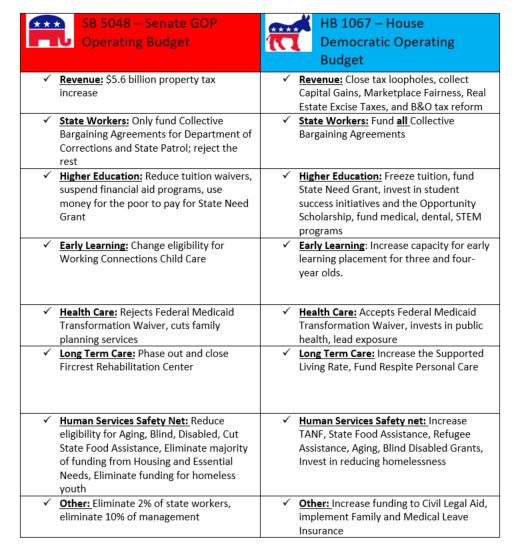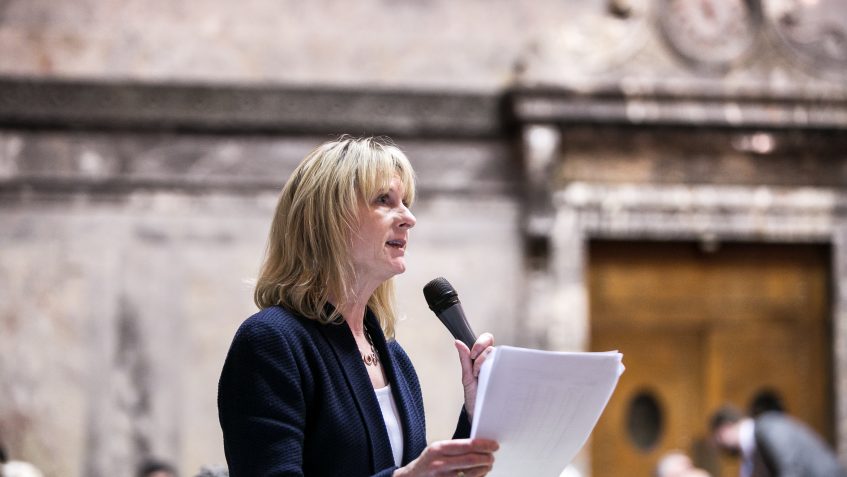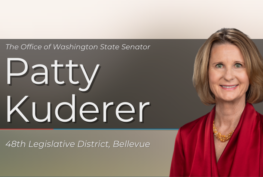
Dear friends and neighbors,
Senate Republican operating budget passes on party-line vote
Two days after Senate Republicans released their 554-page operating budget, it narrowly passed off the floor along party lines, 25-24. I voted no for several reasons. Chief among them is that in truth, this proposal is less about funding education than it is an excuse to raise property taxes aimed mainly at ordinary people, like those of us in the 48th, who live west of the Cascades where property values are highest. Ironically, this same proposal cuts property taxes for large corporations like Wal-Mart, Boeing and Avista to the tune of $183M per year. To be clear, these cuts were not requested; they are a perverse consequence of bad policy that relies almost exclusively on significantly raising property taxes to fund education.
I also voted no because this Trump-like budget slashes already underfunded social services programs. For example, this proposal eliminated funding for housing programs, homelessness and family planning services. It also delayed critical early learning access to our state’s most needy preschoolers. These cuts are unnecessary. To put them in perspective, one (1) year of the unrequested corporate property tax cuts would fund four (4) years of these social services programs. An amendment to recapture that substantial loss failed along party lines. The Republican budget also rejects many of the collective bargaining agreements for our hard working state employees and seeks to permanently sweep the Public Works Assistance Account on which our cities and counties rely.
Most importantly, this budget does not go far enough to invest in our kids’ education. One by one, school superintendents, principals, teachers, school board members, parents, PTSA officers and others in the educational system asked me to oppose this budget proposal because it will reduce funding for schools in our District. That is yet another perverse consequence of bad policy.
During the debate, I included feedback from our local school districts about how the $5.6 billion property tax increase in the education plan would affect schools and people in our district. Click here to watch a speech on an amendment addressing the property tax hike, an amendment to cap the local levies, and my speech on final passage of Senate Bill 5875, the Senate Republican’s tax bill.
Budgets are value statements as much as they are financial documents. They reflect who we are as a community and as a state. I will continue to work hard to uphold the values of the 48th Legislative District to ensure we fully and amply fund education in a manner that is fair and sustainable, without punishing working families, those on a fixed income, or the homeless.
An operating budget proposal from the House
Earlier this week, Democrats in the House of Representatives released their operating budget proposal setting forth a vastly different vision on how to fully fund education in our state. While I am still going through the details, the chart below highlights the primary differences in values and priorities in spending.
 *Please note: this table reflects the Operating Budget proposals as of April 3, 2017.
*Please note: this table reflects the Operating Budget proposals as of April 3, 2017.
Importantly, I have heard nothing but supportive comments from educators for the House operating budget who are elated the new revenue raised under the House budget will ensure schools are fully and amply funded while preserving social services. The House budget also contains much needed investments in health care, higher education and civil legal aid. I invite you to contact me with any questions you may have about the budgets.
The Capital budget makes investments in Washington’s schools and communities
The Senate capital budget builds on the House operating budget and funds improvement, preservation, and infrastructure projects in communities all across the state. The 2017-19 capital budget invests a historic $1.1 billion in new classrooms and school construction, and more than $857 million for our higher education institutions. This budget also invests in affordable housing, our environment, and critical infrastructure.
For the 48th, the capital budget includes funding for a new Pacific Northwest Ballet school, and funding for the Coordinate and Safe Service Center in Redmond. The capital budget, which is separate and independent from the operating budget, passed in the Senate on Thursday.
With less than one month left in the legislative session, we have a long way to go to get to an operating budget that represents the values, compassion, and kindness for which our state is known. I am hopeful we will be able to put our 1.1 million schoolchildren and all Washingtonians first in the final budget.
Best regards,






